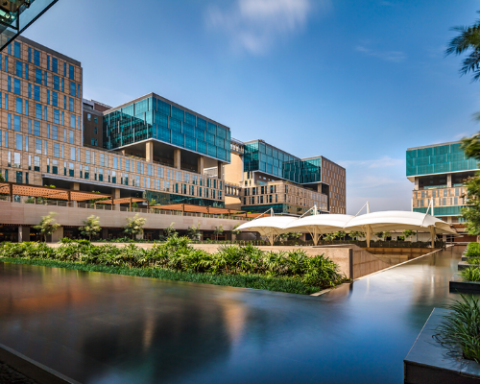

Developer: RMZ Ecoworld Infrastructure Private Limited
Designers: DP Architects Singapore Pte Limited
Location: Bangalore, Karnataka State, India
By Colin Galloway
Rapid economic growth, especially in its booming outsourcing industry, has created millions of new office jobs across India in recent years. However, given the lack of available space in downtown locations, developers have moved to meet mushrooming demand by building vast amounts of new office capacity in-out-of-town business parks, in the process creating sprawling facilities that often cater to tens of thousands of employees.
While the growth of these campus-style developments has been exponential, the rush to build has meant that many Indian business parks suffer from chronic problems of one type or another. That said, however, some of these new developments have adopted an approach that rises above the norm. The RMZ Ecoworld development is one example of a best of class template for the Indian business park space.
Located on the outer ring road of Bangalore, India’s IT capital, RMZ Ecoworld is built on an approximately 80-acre site that offers some 7.5 million square feet of tech-enabled offices spread across 17 buildings. A central ‘bay’ area in the heart of the campus creates a secluded space that also features a 500-seat amphitheater, foodcourt, and green recreational area.
While the types of office facilities on offer are for the most part not dis-similar to those found in other Indian business parks, it is the developer’s community-oriented approach that makes RMZ Ecoworld stand out. During construction, for example, the developer launched a programme offering training to construction workers to help improve their skillsets, while the park’s more-than 50 retail and dining outlets have been made available for use by the wider local community.
Other civic-engagement exercises include a programme of music and other events, a variety of art installations featuring well-known artists, an indoor exhibition space, health and wellness centres, sports clubs, and a net-zero building that is often used for educational purposes.

Beyond that, the project commits to a range of sustainability initiatives. It is LEED Gold certified, having incorporated a number of sustainable design elements in terms of building shape, orientation, and choice of construction materials. It also sports various other green features that include intelligent property management systems, rainwater harvesting, a water treatment plant, 22-acres of landscaping, and two large lakes.
This is not to say that RMZ’s business-park peers are not also sustainable in their own right. India’s campus approach to workspace provision tends by nature to tick various sustainability boxes simply because the shortcomings of local utility infrastructure has forced developers to build their own facilities, creating what one juror described as “self-sustaining islands of development”. While this is a positive as far as it goes, it often creates problems of its own because workplaces are far removed from where workers live, thereby creating an army of commuters who then want to drive to work given the poverty of local public transport options. Not only is this environmentally unfriendly, but in Bangalore it exposes them to the city’s notoriously congested traffic.
In RMZ Ecoworld’s case, however, this problem has been short circuited by the fact that the development is built next to a large residential neighbourhood, allowing many workers to live nearby rather than subject themselves to grueling multi-hour commutes.
In themselves, these finer details of community-oriented design may not seem significant, but collectively they add up to what, in the Indian context, amounts to a significant improvement in working and living conditions. At the same time, as more and more business parks spring up in cities around India, they provide developers and tenants a way both to differentiate themselves from the competition and also address the vexed issue of talent retention, which has become one of the biggest problems for both business parks and the multinational tenants that have taken up residence.






Don’t have an account? Sign up for a ULI guest account.